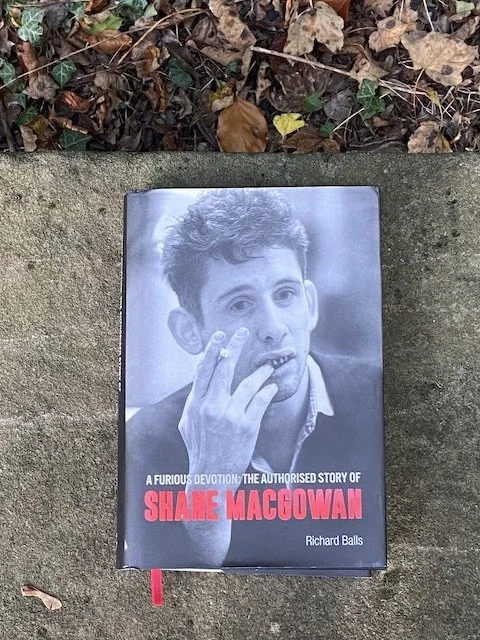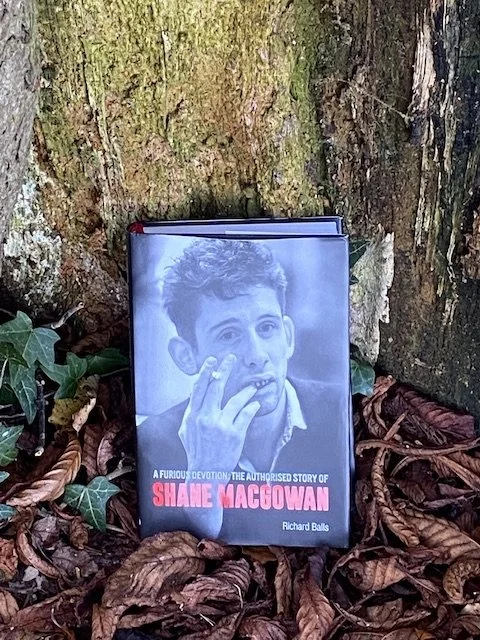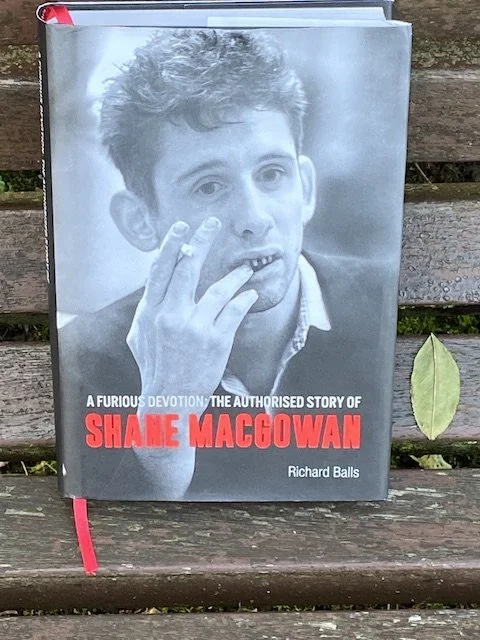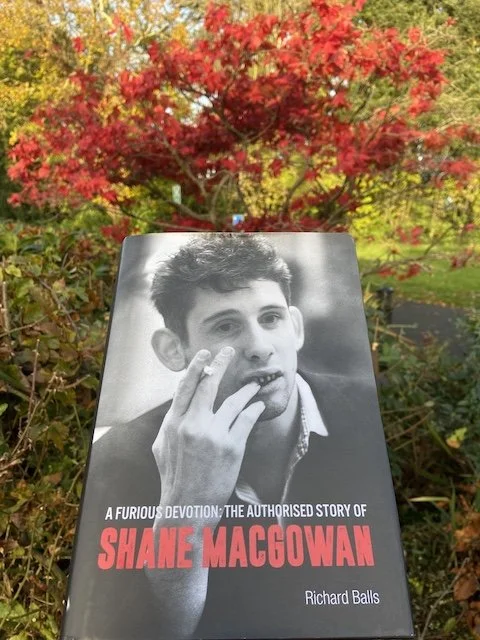Book Review - A Furious Devotion: The Authorised Story Of Shane MacGowan - Richard Balls
The Pogues
I saw the Pogues live back in 1991 when they played at the Feile in Thurles during Ireland’s annual youth pilgrimage, The Trip to Tipp. They couldn’t have been better set up as headliners - Shane’s ancestral home, The commons, was only an hour away; The Pogues were at the height of their fame. and they were playing in front of a huge, young, pissed up crowd. The music was raucous and the atmosphere was electric, but my main memory is Shane MacGowan, sitting at the corner of the stage, nursing a bottle of whiskey, whilst there’s a whirlwind of sound and energy all around him. There were seven other musicians but it was Shane who drew everyones attention; he was the rebel poet, the leader of this rag tag bunch of trad punk rebels. These were our pistols, our clash. And yet, I couldn't help but wonder - why does he seem so lonely up there?
Little did we know then, but this was to be The Pogues last Irish gig until they reformed, 17 years later. When they visited Japan as part of the same ‘91 tour, Shane was sacked from his own band. His words at the time were said to have been, ‘You’ve all been very patient with me……..What took you so long?’
As this engrossing book details, Shane Macgowan was a fairly broken man by this stage. He’d wanted to quit the band for some time, but as he didn't like confrontation or responsibility, he couldn’t do it himself. He needed someone to do it for him, he didn’t enjoy the fame and the gruelling touring schedule had nearly killed him. His legendary consumption of drink and drugs was out of control. This book is the story of one of Ireland’s most favourite sons, from his early days in England to the husk of a man he has now become.
Gifted
Born in England in 1957 to Irish parents, Shane Macgowan seemed to have been an incredibly gifted child. He was consuming classic literature from a young age and one of the stand out parts of the book for me in the first few chapters is the fact that he was so talented at creative writing that his English Teacher at the time actually kept his early stories, identifying him as a literary genius. He gets a place at the prestigious Westminster school, but was already dabbling in drugs at this time, and was more interested in music, having discovered artists such as Dylan and the Grateful dead. Academic achievement was fast slipping down his list of priorities. He was soon up in Juvenile court for drug dealing and was later expelled from school. Maurice, his father, wasn't overly concerned as he knew Shane was incredibly talented and could probably have taught them about English.
A couple of years later whilst still a teen, Shane is discovering punk and consuming a lot of acid and prescribed valium. His own mother was in the midst of a severe depressive episode and this seems to have affected him deeply. It was felt he was heading for a breakdown and he was committed to Bethlem mental hospital, where he stays inside for six months. You can only imagine that this must have been a tough experience for him. We only have snippets of what he said to others, as throughout the book there’s very little input from Shane.
Outside again, punk is in full swing and Shane is one of the early stalwarts of the scene. With a band called The Nipple erectors, they nearly taste mainstream success but never quite get there. Meeting Jen Finer, James Fearnley and then Spider Stacey, an early incarnation of The Pogues are formed, fusing the spirits of punk and trad. Irish music is never quite the same.
“And they said let grief, be a falling leaf, at the dawning of the day”
Drink and Drugs
Although incredibly readable, I found parts of the second half of ‘A furious devotion’ hard going. It’s a long tale of drink, drugs and health problems. There are times when Shane is obviously not a well man, yet due to management pressures he is continuing to tour, and it’s killing him. By the time I see him in Tipp, he’s obviously spent, and with hindsight it does seem to contribute to his long term demise. I did see him a couple of years later, at the Fleadh Mór festival with the Popes, and there seemed to be more life about him but I don’t remember them sounding particularly great. (What a line up that was: Dylan, Baez, Ray Charles, Jerry Lee Lews, John Prine, Nanci Griffith, Jimmy Cliff). The Pogues played that same weekend but I can’t even remember who was singing - Joe Strummer possibly? Anyway, for me, the first three Pogues albums are their greatest works, and they never achieve those heights again - it can be argued that Shane ‘s best work was done by the end of the 80’s. On the third and most commercially successful album ‘If I should fall from the Grace of God’ in 1988, producer Steve Lilywhite says Shane was already a junkie, and just past his peak, whilst the band were firing on all cylinders. But like the proverbial shooting star, they sure burnt out bright and fast.
My main feeling from reading some of Shane shenanigans in the second half of the book is one of sadness. And I shouldn’t feel that way, because it was his choice. I just started to get bored with the stories of excess, and it gets increasingly dark; Two people die of drug overdoses in his company, he’s addicted to smack and it’s one health disaster after another. Sure, you can admire the man’s constitution but you can still wonder how much more he could have achieved, whilst being eternally grateful for what he created.
Richard Balls does a fine job here, because when we meet Shane MacGowan at the start of the book, he's stuck in an armchair, watching television all day with a bottomless glass of white wine and a remote control by his side. Night and day don’t seem to have ever existed for Shane. He speaks sporadically and you have to be there to catch it. You get the sense that he’s actually pickled now, and the drink is just preserving him. By the books end, he needs the help of carers to get in and out of bed and can no longer walk.
Like the best biographers, Richard Balls steers the story along, speaking to all the relevant people along the way. He’s also able to place Shane’s achievements in musical history in context and most of the time you don’t even know he’s there. Credit to him for putting all the material into an immensely readable format.
Like I say, there’s actually not much of a contribution from Shane in ‘A furious devotion’, as he doesn’t seem to be one for journalists. There are plenty of others to tell his story, including his family and friends, fellow Pogues and wife Victoria. I’d like to have heard more from him, his own voice seems peripheral at times, but it’s unlikely he’d be fit to write his own autobiography. He’s meant to be great company, incredibly literate but quite shy with it. That seems to be part of the problem, that he never wanted the fame he has achieved and has struggled to live with it. With his life of constant company, endless partying, countless legal and illegal distractions and the TV that never turns off, Shane seems to be a man afraid to be alone with his thoughts. You wonder what demons he’s wrestling with.
Shane MacGowan and his music mean a lot to me. Discovering his music back in the late 80’s/early 90’s he was our poet laureate, fusing our very own traditional music with the energy of punk to create something unique. It’s always the songs though; songs of the marginalised, the lonely and the broken, the dreamers and the wasters. Songs to roar to, songs to cry to. ‘ We are all in the gutter, but some of us are looking at the stars,’ said Oscar Wilde.
Sally Maclennane, sang at our own boozy Irish wakes over the years whenever my brother was leaving for Australia:
We walked him to the station in the rain
We kissed him as we put him on the train
And we sang him a song of times long gone
Though we knew that we'd be seeing him again
sad to say I must be on my way
So buy me beer and whiskey 'cause I'm going far away (far away)
I'd like to think of me returning when I can
To the greatest little boozer and to Sally MacLennane
‘A pair of brown eyes’
One summer evening drunk to hell
I stood there nearly lifeless
An old man in the corner sang
Where the water lilies grow
And on the jukebox johnny sang
About a thing called love
And its how are you kid and whats your name
And how would you bloody know?
In blood and death neath a screaming sky
I lay down on the ground
And the arms and legs of other men
Were scattered all around
Some cursed, some prayed, some prayed then cursed
Then prayed and bled some more
And the only thing that I could see
Was a pair of brown eyes that was looking at me
But when we got back, labeled parts one to three
There was no pair of brown eyes waiting for me
There’s too many to mention.
And of course, the song that in my family we call our national anthem, called one of the greatest Christmas songs of all time, but is just one of the greatest songs of all time. I don’t even have to name it.
Sad as I found ‘A furious devotion’ at times, it’s a superbly researched biography of one of Irelands greatest musical icons. Thanks for the songs and the memories Shane.
Update Autumn 23 - There have been a lot of updates on social media regarding Shane’s health. He looks poorly in the photographs, so lets hope he sees another Christmas Eve.
November 30th 2023. - Sadly, he didn’t see another Christmas Eve. ‘Sad to say I must be on my way, so buy me whiskey cause I’m going far away.’
Ar dheis Dé go raibh a h'anam dílis but I hope you’re giving it holy hell wherever you are. I’ve shed a few tears this afternoon, but now I've cracked open a beer and am listening to the songs that have been the soundtrack to my life, happy, sad, manic and all the other shit in between. Farewell fella, rest easy - you had the measure of our dreams.
Book review - A furious devotion: The authorised story of Shane Macgowan by Richard Balls
Published by Omnibus Press 2021
334 Pages
If you’ve read this far and liked the article, can I ask that you share it on the social media channel of your choice by clicking below? Thank you!





